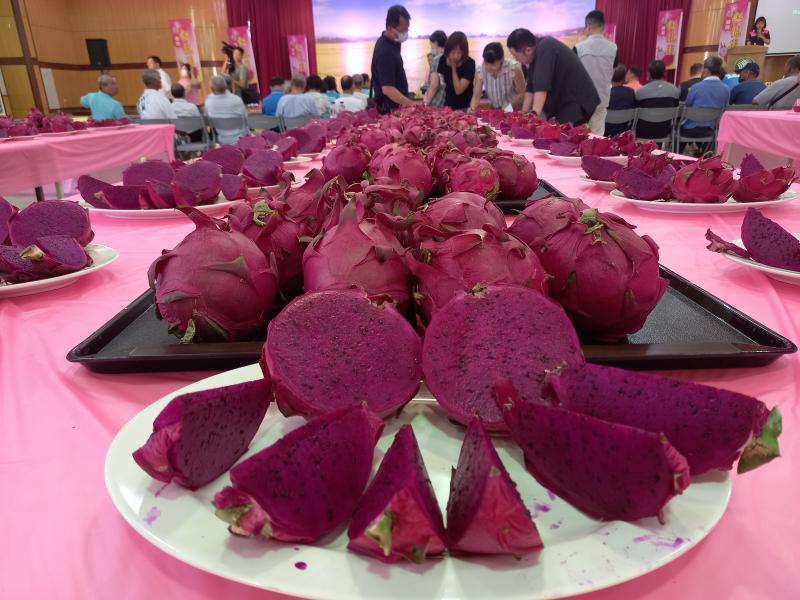Red dragon fruit from Taiwan may now be exported to Japan after eight years of negotiations with Japanese officials, the Ministry of Agriculture announced on Wednesday.
Japan now accepts all types of Taiwanese dragon fruit, following the approval of the white-fleshed variety in 2010.
As red dragon fruit is more popular than the white variety in Japan, the ministry has since 2016 been working with its Japanese counterparts to allow its import.

Photo: Chiang Chih-hsiung, Taipei Times
On Wednesday, the Japanese Ministry of Agriculture, Forestry and Fisheries formally announced that it would accept red dragon fruit grown in Taiwan that meet certain conditions.
As the Oriental fruit fly and melon fly are both found in Taiwan, processing is required to ensure they are not present in fruit exports, the Taiwanese ministry said.
The fruit must therefore be steam-treated, with the interior reaching at least 46.5°C for 30 minutes to kill any potential pests, it said.
In August last year and last month, officials from Japan were invited to inspect testing and processing facilities and found them to be up to standards, it added.
Eleven types of fresh fruits from Taiwan may now be exported to Japan: mango, grape, papaya, dragon fruit, ponkan, two pomelo varieties, lychee, jujube, banana and pineapple.
Taiwanese dragon fruit is also exported to Canada, Singapore, China, Hong Kong, Malaysia, Australia, Brunei, Palau, the United Arab Emirates, Bahrain and the Netherlands.

A year-long renovation of Taipei’s Bangka Park (艋舺公園) began yesterday, as city workers fenced off the site and cleared out belongings left by homeless residents who had been living there. Despite protests from displaced residents, a city official defended the government’s relocation efforts, saying transitional housing has been offered. The renovation of the park in Taipei’s Wanhua District (萬華), near Longshan Temple (龍山寺), began at 9am yesterday, as about 20 homeless people packed their belongings and left after being asked to move by city personnel. Among them was a 90-year-old woman surnamed Wang (王), who last week said that she had no plans

TO BE APPEALED: The environment ministry said coal reduction goals had to be reached within two months, which was against the principle of legitimate expectation The Taipei High Administrative Court on Thursday ruled in favor of the Taichung Environmental Protection Bureau in its administrative litigation against the Ministry of Environment for the rescission of a NT$18 million fine (US$609,570) imposed by the bureau on the Taichung Power Plant in 2019 for alleged excess coal power generation. The bureau in November 2019 revised what it said was a “slip of the pen” in the text of the operating permit granted to the plant — which is run by Taiwan Power Co (Taipower) — in October 2017. The permit originally read: “reduce coal use by 40 percent from Jan.

China might accelerate its strategic actions toward Taiwan, the South China Sea and across the first island chain, after the US officially entered a military conflict with Iran, as Beijing would perceive Washington as incapable of fighting a two-front war, a military expert said yesterday. The US’ ongoing conflict with Iran is not merely an act of retaliation or a “delaying tactic,” but a strategic military campaign aimed at dismantling Tehran’s nuclear capabilities and reshaping the regional order in the Middle East, said National Defense University distinguished adjunct lecturer Holmes Liao (廖宏祥), former McDonnell Douglas Aerospace representative in Taiwan. If

‘SPEY’ REACTION: Beijing said its Eastern Theater Command ‘organized troops to monitor and guard the entire process’ of a Taiwan Strait transit China sent 74 warplanes toward Taiwan between late Thursday and early yesterday, 61 of which crossed the median line in the Taiwan Strait. It was not clear why so many planes were scrambled, said the Ministry of National Defense, which tabulated the flights. The aircraft were sent in two separate tranches, the ministry said. The Ministry of Foreign Affairs on Thursday “confirmed and welcomed” a transit by the British Royal Navy’s HMS Spey, a River-class offshore patrol vessel, through the Taiwan Strait a day earlier. The ship’s transit “once again [reaffirmed the Strait’s] status as international waters,” the foreign ministry said. “Such transits by